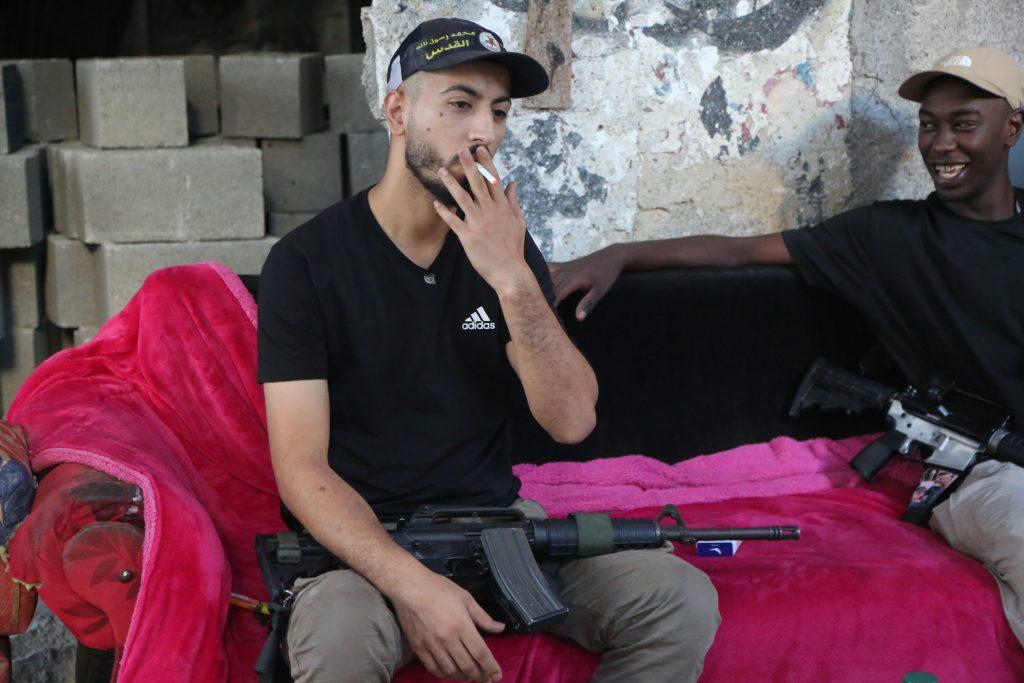
Last month, I met the commander of the Palestinian Islamic Jihad’s al-Quds Brigades — part of the broader Tulkarem Brigade — in an alley in Tulkarem refugee camp in the northern occupied West Bank. Ghaith Radwan greeted me with a slight smile and confident eyes, which did little to hide his evident caution. He and a number of resistance fighters in Tulkarem refugee camp welcomed me and the group of journalists for a brief interview to talk about the one-year anniversary of October 7. The young fighter, with his rifle in his lap, told us about why he chose to fight the Israeli army.
Ghaith, only 27 years old, told us about how he joined the ranks of the resistance in Tulkarem refugee camp over the past year. He talked about how, after October 7, his dream of traveling freely throughout Palestine without checkpoints was no longer a faint hope.
“Everyone has the ambition to be free,” he said. “To walk around like in any independent country without finding a PA checkpoint a few meters ahead and an Israeli checkpoint after that, and beyond that, settlers attacking.”
“We are living inside a prison,” he explained.
Not long after we met, on Thursday, October 3, Ghaith was one among 20 Palestinians who were killed by an Israeli airstrike on a residential building in the middle of the camp. In addition to Ghaith, Zahi Oufi, commander of the Hamas-aligned Qassam Brigades in the camp, was also killed.
Along with the fighters, an entire family on the second floor of the building was wiped out, including the mother, father, two children, and two grandparents. Ghaith and his comrades had been sitting in a popular café on the building’s ground floor when an Israeli fighter jet dropped a bomb on top of the building, marking the first time since the Second Intifada that such an aircraft had been deployed in the West Bank.
The stories of Ghaith and many of his comrades have been cut short over the past several months ever since the Israeli army launched a large-scale military operation in the northern West Bank called “Operation Summer Camps,” which lasted several weeks.
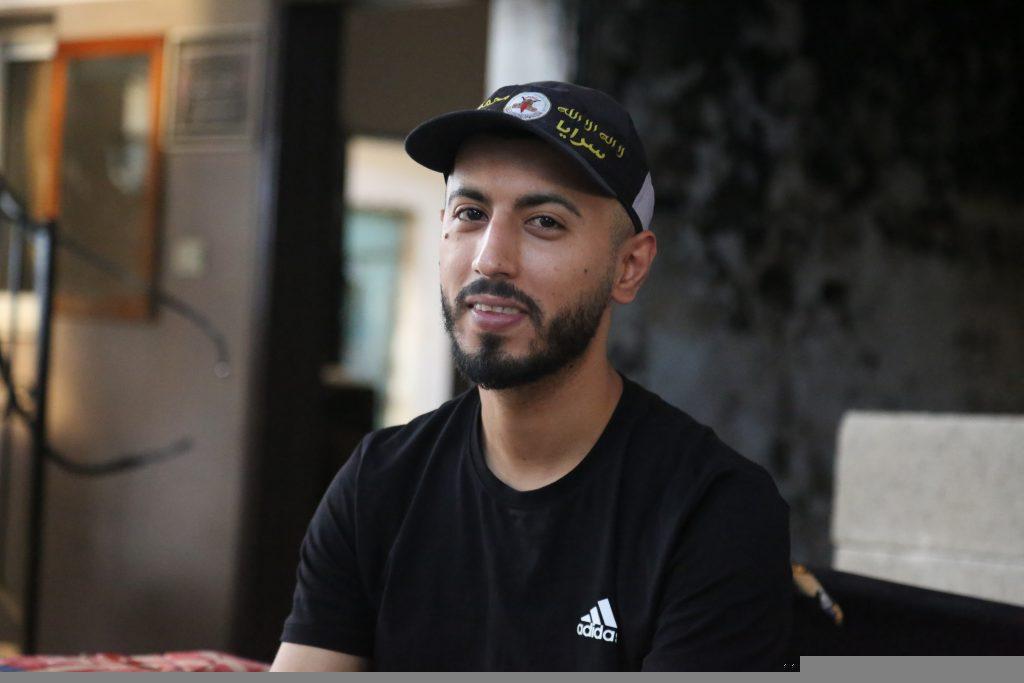
Ghaith Radwan, a resistance fighter in the Tulkarem Brigade, September 2024.
Fighting an asymmetric war
Since October 7, the tactics of Israeli forces in dealing with the West Bank have changed. The Israeli army began using airstrikes with drones, apache helicopters, and — for the first time on October 3— fighter jets. According to the Moata Palestinian Center, the Israeli army has conducted 998 raids across the entire governorate of Tulkarem since October 7. Additionally, 601 properties belonging to residents were destroyed, including the total destruction of 125 homes.
During the interview, Ghaith told Mondoweiss that their fight with Israel was unfair due to the vast imbalance of power.
“I face the occupation with a rifle and a few bullets, while they face me with warplanes, bulldozers, military vehicles, and reconnaissance drones,” he said. “It has never been a fair fight. The occupation army invades the camp in full military gear, and all I have is this rifle.”
Ghaith motioned towards the M-16 placed on his lap, one of many such weapons that are bought on the black market in the West Bank, mostly from Israel. He made sure to note that despite all of its military power, Israeli forces could not reach the fighters except through airstrikes and targeted attacks by drones. He told us that most resistance fighters in Tulkarem refugee camp have been killed in this way rather than through ground confrontations.
“In confrontations, the army is weaker than you might think,” said Tareq al-Doush, 29, one of Ghaith’s companions and a local commander of the Fatah-aligned al-Aqsa Martyrs Brigades in the camp. He nodded in agreement at Gaith’s assertion. “Most of our martyrs were killed by airstrikes, not by bullets.”
“They are only stronger with their planes and their armored vehicles,” Tareq said.
Ghaith continued telling us about how he joined the resistance in Tulkarem, which had developed over the course of two years of rising armed resistance in the northern West Bank. One of the most important milestones in those years was the founding of the Tulkarem Brigade in March 2022, an umbrella group of organizations that included Fatah, Hamas, and the Palestinian Islamic Jihad.
“The hardest thing I’ve experienced is the martyrdom of my brother, and then my friends,” Ghaith said. “This made me continue on my path. But we are not fighting for a martyr or for anyone else; we are fighting in search of freedom. A foolish soldier who knows nothing about life comes and shuts down our streets and controls our lives. Those who imprison us are strangers to this land, and they should go back to their countries.”
In the early days of his involvement in the resistance, Ghaith says things were easier. “There were no D9 bulldozers, and there wasn’t as much destruction in the camp,” he said. After October 7, Israel’s raids intensified in terms of fatality, duration, and scale of destruction. “Some surrendered, while others continued along the path of resistance. And we kept going.”
The recent raids were difficult for Ghaith and his fellow fighters because Israeli forces would resort to collective punishment to dissuade the community from sheltering the resistance youth. “They took out their anger on the camp residents and their properties. They destroyed its infrastructure and punished the people of the camp,” Ghaith explained. “Every house we would seek shelter near would have bombs planted in them [by the army] and blown up.”
For Ghaith and the other members of the Tulkarem Brigade, the objective of these punitive measures was clear. “They are trying to destroy the popular support base in the camp,” he said.
I asked him how he felt surrounded by all this destruction, and he answered that it drove him to seek revenge. “The occupying settler wants to impose his power over us. He wants to show that he is in control.”
“But once the raid is over, many people check in on us and express their gratitude that we are safe. When they look at the destruction of the camp, they just say, ‘better to lose your wealth than lose your children,’” he continued.
Tareq al-Doush echoed Ghaith’s sentiments, insisting that the fighters drew their strength from the camp’s popular support base. “Our resolve comes from the women, elders, and children of the camp,” he explained. “They give us our strength.”
“We will continue to mobilize, generation after generation,” he vowed.
When we asked Ghaith if he feared that the resistance might end after him, he replied with a slight smile. “It’s true that Palestine is a land of ‘birth,’ but a person can’t help but feel fear about what will happen after their martyrdom. Will there be people who will remain on this path?”
He paused for a moment before continuing. “This path has never stopped for anyone. When Jihad Shehada who founded the Brigade in Tulkarem refugee camp was killed, everyone said that his death would end the resistance. But on the contrary, it intensified. In Jihad’s time, we were seven guys, and then our numbers increased. Whenever one of them was martyred, we only grew.”
The promises of October7
“Gaza definitely impacted me. When October 7 happened, we celebrated here in Tulkarem refugee camp with a car parade and kept driving through the neighborhoods. Of course, it gave me motivation and made me believe that we will be liberated. We are fighting here for our homeland and our dignity,” Ghaith said.
“October 7 was like a dream for us,” Tareq added. “I am sure that we will sleep and wake up again to see the dream grow even larger. We will be liberated.”
Tareq believed that the war on Gaza brought the resistance fighters together and united the different resistance factions. The Tulkarem Brigade exemplified this unification. “The factions do not divide us. In the end, we are the Tulkarem Brigade…we are all from the same camp, the same people, the same blood, and we live for one goal.”
Another resistance fighter who preferred not to be named said that the assassinations, bombings, and raids that the Israelis have been carrying out since October 7 were all an attempt to erase the joy Palestinians felt on that day.
“Every time I hesitate to pick up my weapon and resist the occupation, I remember October 7,” he said. “And I feel that our freedom is close.”
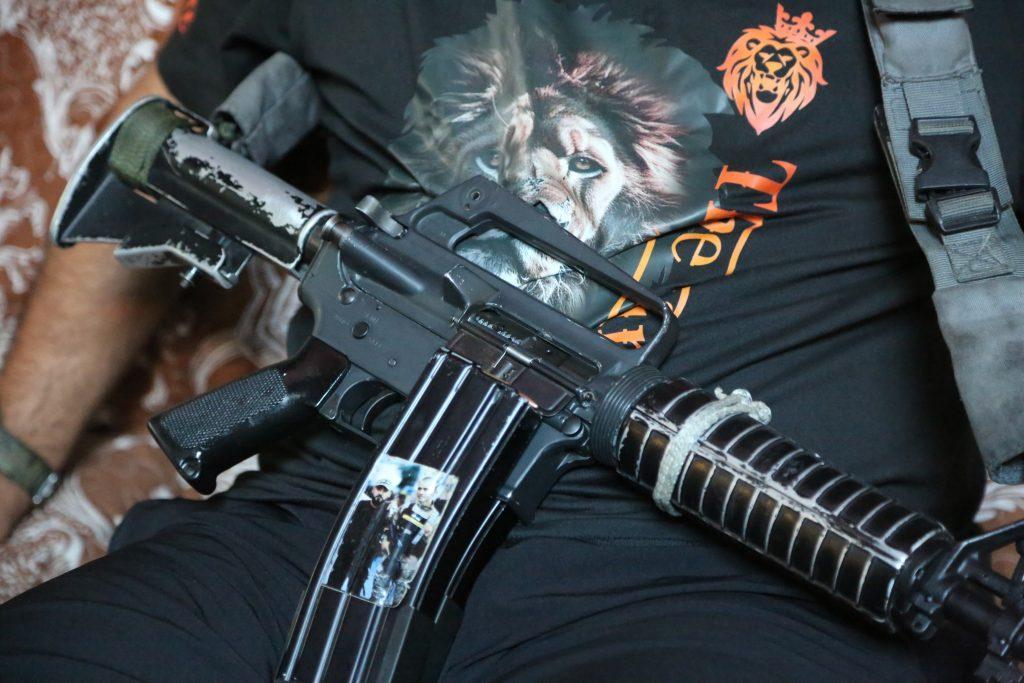
Dreams of freedom
Most of the resistance fighters I’ve met over the years have been no older than 30, and the majority have been in their twenties. Being so young, Ghaith and his comrades’ resolve to join the resistance prompted us to ask them why they resisted.
What was consistent in all their answers was the life they wanted to lead after liberation. Most of them expressed disarmingly simple aspirations, like being able to drive a car for hours without being stopped at a checkpoint, or moving freely without the fear of being killed by a soldier’s bullet or assaulted by a settler mob. Others just longed for not living with the constant fear of being arrested, a feeling they experienced long before they became fighters.
“My personal dream is to live like any person who is comfortable in their life. There is no Palestinian who is comfortable. Anyone who says otherwise is lying. No one can be at ease while being occupied,” Ghaith said. “The comfortable one is either a traitor or has no problem with the occupation.”
Ghaith’s other dream is the same as any other fellow descendants of refugees who grew up in the camp. They all want to go back to the villages and towns from which their ancestors were displaced in 1948. “My roots trace back to a village called Wadi al-Hawaris in the Haifa district,” Ghaith explained. “My grandfather used to tell me about it and what their lives were like. I’m fighting the occupation because I want to visit my land one day. Every Palestinian, every person, every refugee has a dream of returning to their land.”
Tareq’s answer is no different. He spoke of his dream of returning to the village of Sidi Ali in the Jaffa district, from which his grandfather was displaced. “Every day, I would sit with my father and grandmother, and they would tell me about my village overlooking the sea. This conversation has been etched in my mind since childhood,” he said.
“I will keep resisting until I reach that village overlooking the sea. I love the camp, but this is not our place. Our place is in Sidi Ali,” he vowed.
Tareq was the eldest among the resistance fighters in Tulkarem refugee camp. I had earlier encountered him speaking with his comrades in the camp’s alleyways. I got the impression that the other fighters treated him like he was an older brother. When I asked for someone to interview, everyone immediately mentioned Tareq’s name, knowing him to be an eloquent speaker.
But when I asked Tareq about what it was like leading everyone, the first thing he mentioned was his mother. “I haven’t seen my mother for ten days. The occupation bombed our multi-story house and burned it down, and my mother moved to live in another house, which is difficult for me to reach,” Tareq said. “Every ten days or so, my mother comes to see me here in the streets and alleys.”
I asked him what his message to his mother would be. “God willing, we will be liberated. And if I become a martyr, I want to tell her that she is the person I love most in life, and her faith in God should remain strong. I don’t want her to grieve for me; I want her to rejoice in my martyrdom.”
The paradox in these fighters’ answers was striking. They all said that they were fighting to be able to live a different life, and every one of them was living with the expectation that they would be killed at any moment and become martyrs. The dream of a different life, for many of them, has stood side by side with the dream of martyrdom itself.
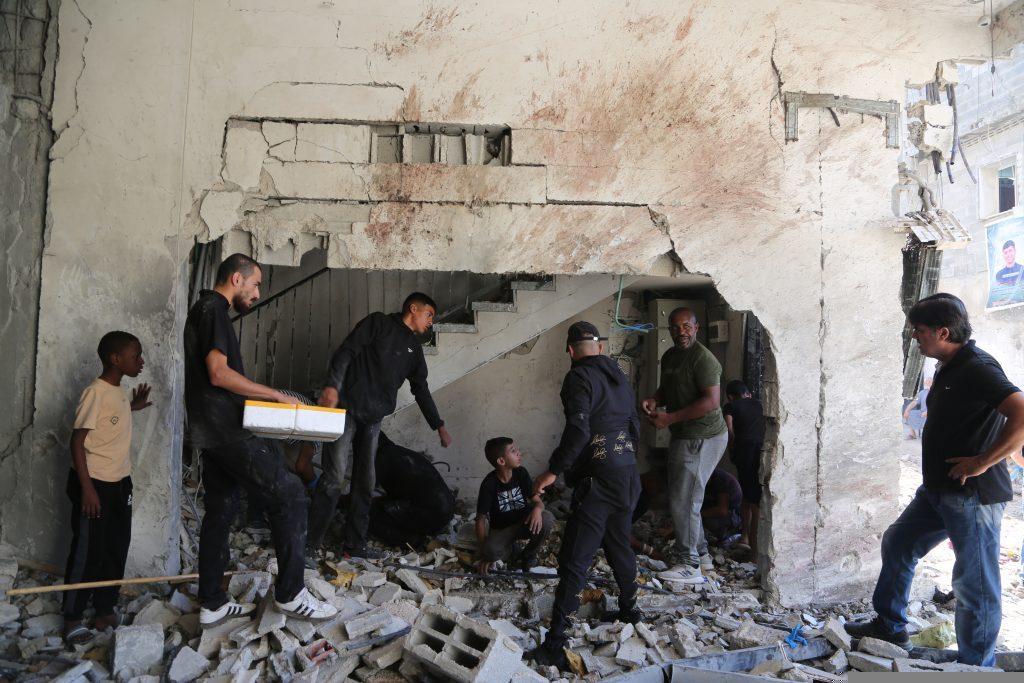
Aftermath of the Israeli airstrike that killed 20 Palestinians in Tulkarem refugee camp, October 3, 2024.
The day after the airstrike on the cafe that killed Ghaith and his comrades, hundreds of residents took to the streets to participate in their funeral procession. During Ghaith’s funeral, people carried him on their shoulders, chanting to him with a mournful melody: “Where are you going, Ghaith? You opened our wounds!”
Then another chant responded, louder and more insistent than the first, as if answering Ghaith’s injunction to continue the struggle after he was gone: “Ghaith, you are our leader, our hero, our teacher! We learn from you, Ghaith!”
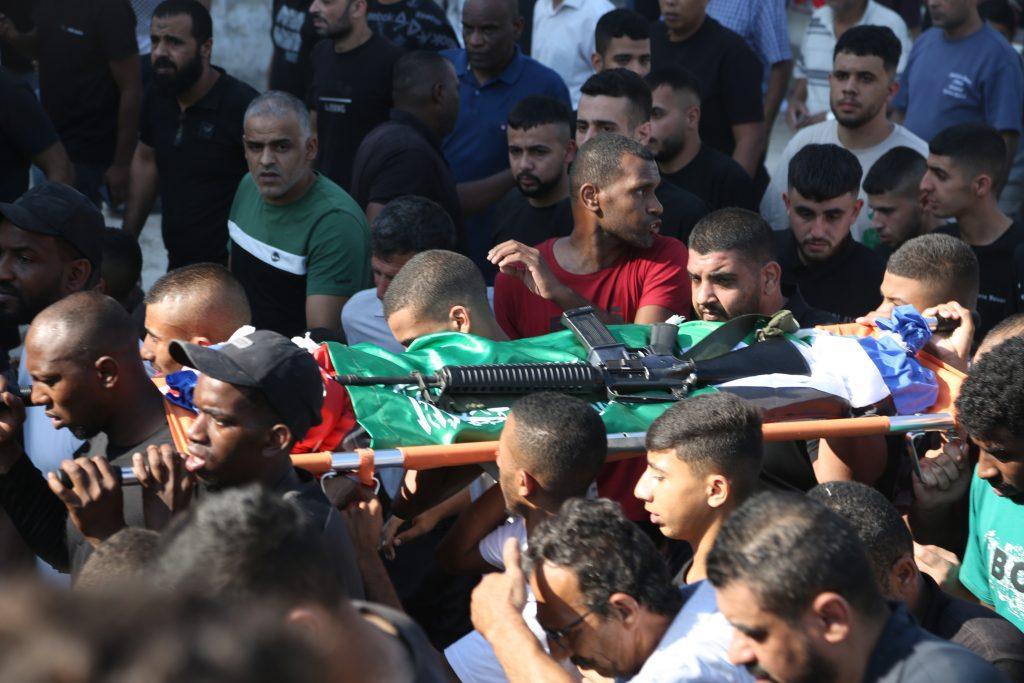
From: Mondoweiss